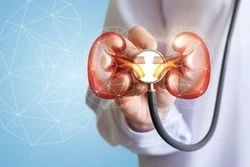The kidneys are a pair of vital organs that purify the blood and remove waste from the body. They are bean-shaped organs located below the rib cage, and their size is equivalent to the fist. They release hormones to regulate blood pressure and control red blood cell production. The function of kidneys is vital since they eliminate waste products, drugs, and toxins through the urine. Some people have renal agenesis, i.e., they are born with only one kidney. People with kidney dysplasia have both kidneys at birth, but only one works. Some people donate a kidney or have one removed due to certain diseases.
People can surely live a healthy life with one kidney, but survival is not possible without both.
Kidney Diseases
Certain conditions may damage the kidney. Kidney stones or renal stones are formed inside the kidneys due to deposits of salts or minerals. An excess of mineral salts or uric acid in the body can lead to kidney stones. Pyelonephritis or kidney infections are a type of urinary tract infection. They occur when the infection travels upwards to the kidneys from the urethra and urinary bladder. Kidney cysts may occur when injury or damage causes fluid accumulation.
Diabetes, high blood pressure, genetic conditions, or heart diseases can cause chronic kidney disease (CKD). CKD gradually damages the kidneys. Acute Renal Failure (ARF) leads to damage or complete failure within a short time. Shock, medication, dehydration, or burns are some of the causes of ARF or acute kidney injury. Renal Cell Carcinoma is the most common type of kidney cancer. The risk factors for kidney cancer are smoking, obesity, hypertension, or family history.
Symptoms of Kidney Problems
Very few patients with chronic kidney disease know they are suffering from it. In some cases, people do not experience the symptoms until later stages. The only way to confirm if you have kidney disease is through tests. Annual tests are essential if you have a family history, diabetes, or high blood pressure. People older than 60 years are also at risk for kidney diseases. Talk to your doctor about a kidney function test if you experience the following symptoms.
- Fatigue, tiredness, or trouble concentrating
- Sleep apnea or difficulty sleeping
- Dry, itchy skin
- Frequent urination
- Blood in urine
- Persistent puffiness around the eyes
- Swollen feet and ankles
- Muscle Cramps
- Poor appetite
- Changes in urine - excessive bubbles or foam
Kidney Function Tests, Uses & Types
Kidney function tests are conducted to evaluate if the kidneys are functioning correctly. These can be blood or urine tests, most of which calculate glomerular filtration rate (GFR). GFR indicates the effectiveness of kidneys in removing waste from the system. Conditions like diabetes and hypertension may affect the proper working of kidneys. Monitor these conditions and discuss with your healthcare practitioner if you need to undergo a kidney function test. Symptoms like blood in the urine, painful urination, or frequent urination indicate kidney problems. You may need a kidney function test if you have any of these symptoms.
Your doctor may prescribe any of these kidney function tests to estimate GFR:
- Urinalysis - Checks urine for blood, proteins, and function
- Serum Creatinine Test - Evaluates creatinine build-up. Creatinine is a waste product generated from muscle tissue breakdown
- Estimated GFR - Determines filtration rates depending on age, gender, protein levels, etc.
- Blood Urea Nitrogen (BUN) - Measures nitrogen in the blood resulting from protein breakdown
- Microalbuminuria - Detects the presence of protein albumin
Test Procedure & Results
A urine sample is taken for 24 hour period for a creatinine clearance test. This test lets your doctor know how much creatinine your body eliminates in one day. Follow the instructions given for the collection and submission of the sample.
Serum Creatinine and Blood Urea Nitrogen (BUN) tests are blood tests. The technician will draw blood from your arm through a needle, like any other blood test.
Tests for kidney diseases are simple, and you should typically not experience any side effects. However, some people have mild bruising and experience dizziness or fatigue after the blood tests. Urine and blood tests for detecting kidney diseases do not have long-term complications or pain. Speak to your doctor if you experience symptoms that persist after the tests.
Most tests evaluate two factors to determine if your kidneys are working properly
- If GFR < 60, it can indicate kidney disease
- If UACR (Urine albumin-to-creatinine ratio) > 30 mg per gram can be considered a warning for kidney disease
Conclusion
Kidneys are essential to remove waste from your body. Diabetes, high blood pressure, or family history can impact kidney functions. Kidney function tests are important for diagnosing kidney disease and ruling out infections. Your doctor can explain the test results and develop a treatment plan. You may require further testing, medications, and consultation with a nephrologist.



